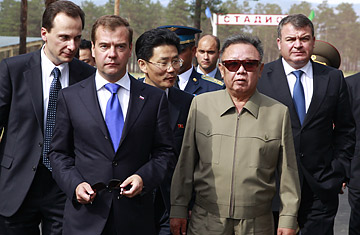
Russian President Dmitry Medvedev, front left, and North Korea's leader Kim Jong-Il, front right, during a meeting at Sosnovy Bor Military Garrison, several thousand miles east of Moscow, on August 24, 2011.
Kim Jong Il, the dictator of North Korea, seemed so happy this week to be out and about. He doesn't travel much. Due to his fear of flying (and of invisible assassins) he only goes as far as his armored train can carry him, which is usually no farther than China. The other problem is that he doesn't get a lot of invitations. Since President George W. Bush branded him a member of the "axis of evil," and even before, Kim's diplomatic life has been a pretty lonely one. Which may help explain how smiley the morose old despot was when Russia had him over for his first visit since 2002. Thanks to the hospitality, he may even have let down his guard.
On Wednesday morning, before his meeting with Russian President Dmitri Medvedev in the city of Ulan-Ude, Kim went to take in the sights. There isn't a whole lot to see in that part of Siberia, so his first stop was the city's central square, which is home to the largest Lenin head in the world, a seven-meter-tall bronze cranium of the Communist revolutionary set atop a giant block of stone. Kim seemed impressed. He craned his neck to ponder it for a moment, and then got back into his armored Mercedes to go take a tour of the local mall. "I didn't see a lot of security guards around, or even a big entourage," says Alexander Nemchinov, a salesman at the mall's bait and tackle shop, who went to have a look at Kim. "He seemed like a jolly old guy, dressed kind of funny, but he looked impressed with everything."
In most of the photographs taken of him during the trip, Kim's default expression was still a poker face. But he did seem jollier than usual, and was clearly in a good mood when he met with Medvedev that afternoon. "We're having a fun trip," he told the Russian president. Their talks were also unusually productive, or as the official Korean news agency put, "overflowing with friendship."
According to the Kremlin spokeswoman Natalia Timakova, who spoke to reporters afterward, Kim said he was keen to resume the so-called six-party talks (with the U.S., Russia, China, Japan and South Korea) on North Korea's nuclear disarmament, and he wanted to do so without any preconditions. Those talks have been stalled in part because of preconditions set by the U.S. and Japan, who want North Korea to freeze its nuclear program before sitting down at the negotiating table. On this point, Kim may have begun to budge on Wednesday. As soon as the six-party talks begin, "they will be ready to impose a moratorium on the production and testing of nuclear material," Timakova said in summarizing Kim's position.
But the real breakthrough came later, when the two leaders agreed to build a natural gas pipeline through the Korean peninsula. This project, which Russia and South Korea have been considering since 2008, would be a huge vote of confidence in North Korea. The pipeline would cost billions of dollars to build, and once completed, it could earn Kim's government up to $100 million per year in transit fees as well as major discounts on its natural gas. More importantly, it would interlink North and South Korea's energy security, making the two rivals more interdependent — and thus less likely to go to war.
"So what Russia is proposing is a new paradigm for resolving this conflict," says Fyodor Lukyanov, a foreign policy expert and editor of the journal Russia in Global Affairs. The western approach to the problem — intermittently trying to bait Pyongyang with economic goodies and punishing it with sanctions — has only isolated the regime over the past decade and a half. Kim has become more paranoid about foreign intrusion and more prone to belligerence, such as the shelling of the South Korean island of Yeonpyeong last November. What's worse, since the West began the carrot-and-stick approach to disarming Kim in the 1990s, his regime has gone from having nuclear ambitions to building warheads and testing missiles. "If I was in the West's shoes, I would start to ask myself by now, 'Maybe this isn't working?'" Lukyanov says.
The idea of trying out pipeline diplomacy, however, carries serious risks for Russia. Clashes are still common between North and South Korea, who have technically been at war since the 1950s, and energy experts have dismissed the pipeline idea as way too dangerous. But Medvedev hinted on Wednesday that it was as much about diplomacy for Russia as it was about money. "We went through all the questions, and of course, this [pipeline] has major significance considering the tensions that remain on the Korean Peninsula," Medvedev said. "Let's hope the project works out well."
But whether or not it does, Russia's contribution suggests a turn away from the stalled efforts of China, which has acted like a controlling older brother, and the U.S., which has tried to coerce Kim into submission. "This is Russia seeking leadership in a multi-polar world," says Matthew Rojansky, deputy head of the Russia program at the Carnegie Endowment in Washington. "They are saying, 'Look, we are a leader on this thing, and we are going to handle this diplomatically.'"
Considering Kim's growing isolation over the years, some old-fashioned diplomacy — and hospitality — may be enough to soften him up.
